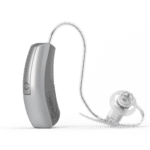Treating hearing loss with the use of hearing aids reconnects you to the people and sounds of your life. For those who love to travel, treating hearing loss eases the stress of communication and makes the experience a little bit easier. That being said, we all know that traveling can be extremely stressful, from flight delays to big crowds of people. With a bit of preparation, your trips can be streamlined and simplified. Here, we provide you with a guide to traveling with hearing loss. with 4 helpful tips.
Before you go on your trip, schedule an appointment to have your hearing aids cleaned and tuned-up. You can schedule an appointment for a “clean & check” at any of our hearing centers across the country. Our licensed team of hearing professionals will provide your hearing aids with a professional cleaning and will check for any parts requiring maintenance. If repairs or other maintenance items are necessary, we are well-versed in taking care of these issues in-house. If you have experienced changes in your listening experience, inform your Ear to Hear hearing specialist. We will check your hearing aids to see if there are any programming changes necessary that may improve your listening experience. As hearing abilities are constantly changing, it may be that your hearing aids need to be updated to meet your current hearing abilities. A free hearing test will let us know if your hearing abilities have changed since your last visit.
2) Make a Packing List & Checking it Twice
If you use rechargeable hearing aids, make sure that you have your recharging station. If you plan to travel to a foreign country, make sure that you have an adaptor that works. Adaptors are easily found at a hardware or electronics store. For people who use traditional hearing aid batteries, make sure you have a supply that lasts the extent of your trip. You never know if the same battery models are available where you’re going, and you also do not want to run out unexpectedly in the middle of your trip. If you’re traveling to a humid place, consider a dehumidifying unit. These devices remove moisture from your hearing aids and make sure that they are dry and functional by the time you wake up in the morning. Don’t forget to bring your cleaning supplies, any tools you’ve been provided by your hearing instrument specialist, and a soft cloth to clean your hearing aids.
3) Prepare for the Transportation Portion of Your Adventure
Now that you’re packed and ready to go, there’s the transportation to contend with! As most of us know, airports and other transportation hubs can be overwhelming acoustic spaces. Between the hard surfaces and fuzzy PA speakers, it may be difficult to hear announcements from the airlines. In these moments, you can use technology to your advantage. Depending on your hearing aid model, you may have telecoils, which allow you to connect to hearing loops that may be installed in public spaces. These are useful at the ticket counter or if you’re trying to hear announcements at your gate. If you use wireless, digital hearing aids, you may activate different features through a remote- control app on your smartphone. Noise-cancellation features help you focus on the sounds you want to hear, while your smartphone’s microphone could be used to amplify speech sounds that are difficult to access. Sign up for text or email alerts to your phone, just in case you miss the sounds over the announcements.
4) Communicate in Advance with your Hotel or Hosts
In the US, under the Americans with Disabilities Act (ADA), hotels and motels are required to provide accommodations for people with hearing loss. Let the concierge know about your hearing needs before you arrive. Accommodations include alarm clocks and emergency notifications for people with hearing loss. If you’re staying with friends or loved ones, let them know beforehand about any accommodations you may need. Be sure to store your hearing aids in a safe, dry place, away from the reach of children and pets. Avoid storing your hearing aids in the bathroom, especially if it is a communal space, as the moisture may cause harm to your devices.


